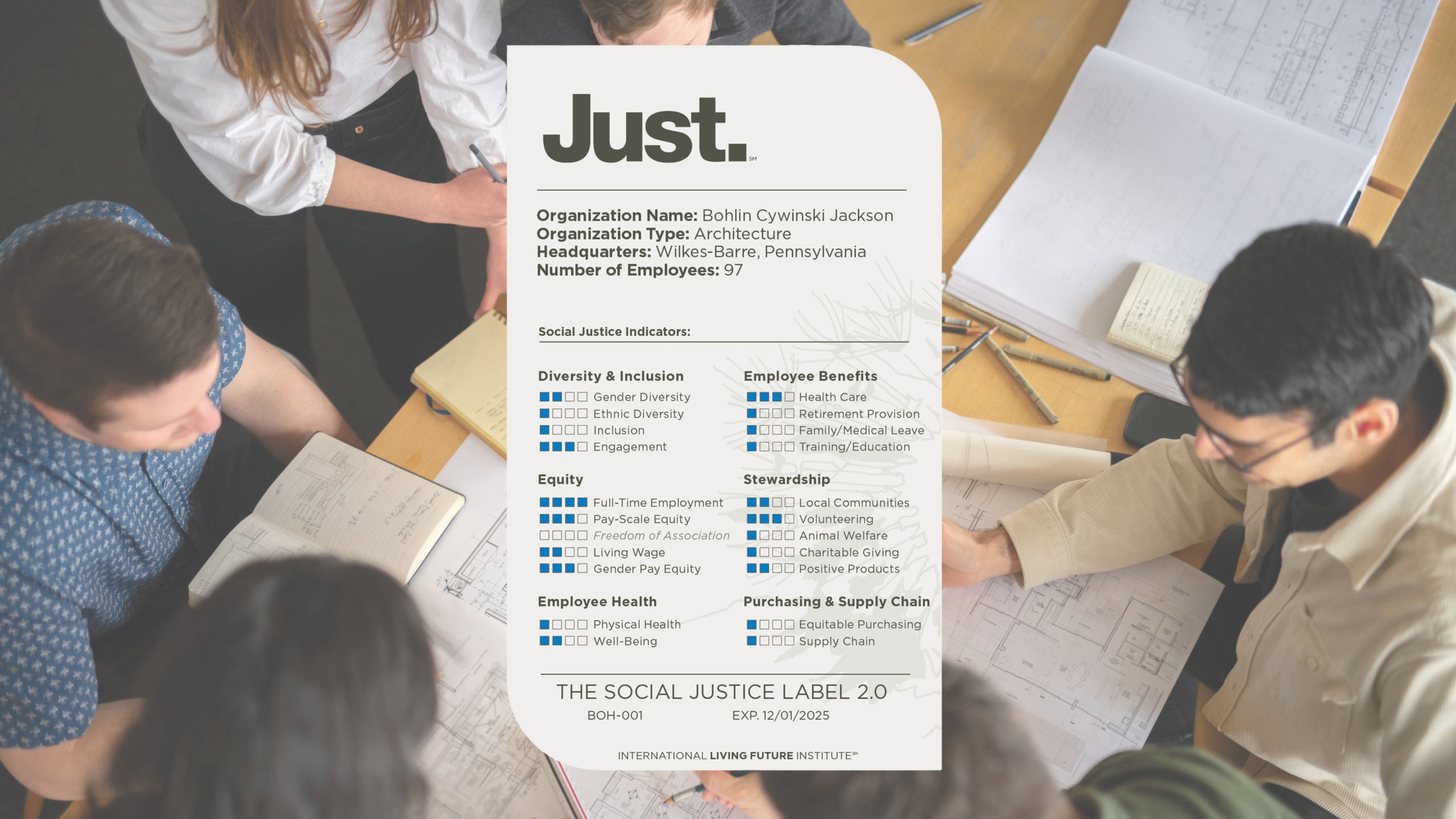
Why We Are a Just. Organization
We are proud to announce an important milestone for our practice – earning a Just. Label from the International Living Future Institute (ILFI).
“We’re excited to use the Just. Label as part of our ongoing commitment to a more equitable and transparent design practice.”
As a collaborative practice of six studios across the country that strives to live our values, and clearly communicate these values to our clients, collaborators, and community, the Just. Label is an exciting milestone. Just. is a “nutrition label” for socially just and equitable organizations. As a voluntary disclosure tool, it offers a transparent platform for our practice to share a range of organizational and employee-related indicators. To register, organizations submit numerous statistics and operational information to ILFI, which then ranks against achievement levels across Diversity & Inclusion, Equity, Employee Health, Employee Benefits, Stewardship, and Purchasing & Supply Chain.
The Just. Label is an important benchmark that we will use to continue to measure growth and progress each year. Here, Victoria Messina and David Kitchen, members of the Just. Label focus group, which led the firmwide effort, share more about the Just. Label process, insights gained, and more.
Firmwide Connection
In a period of remote work, launching a collaborative effort to gather and organize a significant amount of information with members from each of our studios was an exciting and challenging process. Victoria, an Associate in our Pittsburgh studio, notes that those involved with the Just. Label process brought diverse perspectives and experiences to the effort – whether through prior participation in BCJ’s Equity, Diversity, and Inclusion committee or volunteering in community organizations. During the pandemic, our practice engaged in a series of firmwide conversations led by Team Dynamics, an interdisciplinary group that helps build capacity toward being a more equitable, diverse, and inclusive organization. “Our practice worked with Team Dynamics for a year discussing these topics,” adds David, a designer in our Pittsburgh studio. “That work overlapped perfectly with the Just. Label’s ethos.”
In tandem with our Team Dynamics work, Victoria and Tina Faust, an Associate in our Philadelphia studio, explored how we track progress and keep ourselves accountable as part of a deep dive into the AIA’s Guides for Equitable Practice. As Victoria notes, “the Just. Label is a model that is used in the architecture community, especially with like-minded design firms, and made sense to implement at BCJ.”
Process Benefits
“The Just. Label process has helped our practice establish benchmarks and will provide a framework for continued improvement,” says Victoria, who has also served as the Pittsburgh Chapter President of the National Organization of Minority Architects (NOMA). “When we began pursuing the Just. Label, we found that it aligned well with our core values, but we needed to establish better processes and gather supporting data to reinforce these efforts. The Just. label gives us a powerful and public way of committing to what we believe in – it gives us the why and how.”
David also highlights the significant value in connecting with and engaging people across our practice on this effort and, in turn, reinforcing our “one firm” approach. “EDI affects every part of operating a practice and Just. Label indicators cover everything from equity in the form of employee benefits to stewardship within our local communities,” adds David. “Focusing on the Just. Label and having representation from each of our six studios in this effort was important to understand common ground and establish a basis to continue practice-wide growth and improvement.”
Measuring Progress
Our label is a snapshot of our current practice, which we continually monitor to gauge progress and improvement. Victoria and David note that one of the primary challenges was the large amount of information required and the associated time to gather data, while balancing ongoing project work. Both also highlight the importance of support and advocacy from practice leadership, as well as engagement from all our studios. Says Victoria, “Ray Calabro, Principal in our Seattle studio, former Seattle Principal Patreese Martin, HR Managers Sandra Coach and Nicole Crandley, and others were instrumental at every stage and continued to support the effort as it evolved.”
This achievement was a collaborative effort, and we thank everyone involved in the Just. Label focus group. We look forward to sharing future updates with our community as we continue to shape our culture and practice.